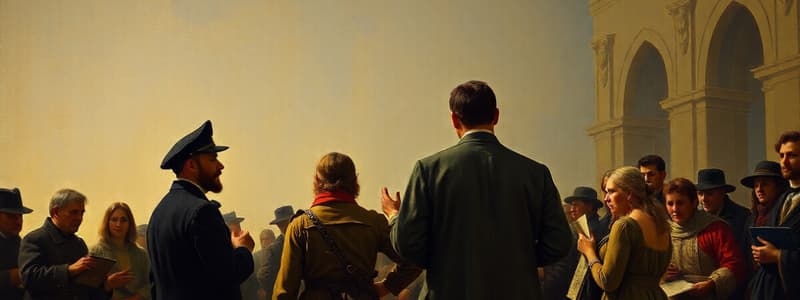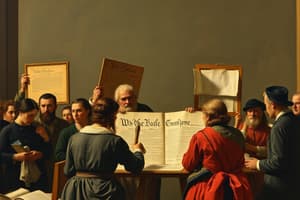Podcast
Questions and Answers
What did the 15th Amendment achieve?
What did the 15th Amendment achieve?
- Granted women the right to vote
- Granted African American men the right to vote (correct)
- Allowed citizens to elect senators
- Eliminated property qualifications for voting
Which of the following best describes retrospective voting?
Which of the following best describes retrospective voting?
- Choosing candidates that align with personal benefits
- Voting based on party loyalty
- Making decisions based on a candidate's past performance (correct)
- Evaluating candidates based on their future promises
What factor can significantly affect voter turnout?
What factor can significantly affect voter turnout?
- Interest group representation
- Political efficacy (correct)
- Electoral participation frequency
- Political cynicism
How have third parties in the U.S. struggled for representation?
How have third parties in the U.S. struggled for representation?
What role do political parties primarily play in elections?
What role do political parties primarily play in elections?
The Voting Rights Act is primarily aimed at what?
The Voting Rights Act is primarily aimed at what?
What is the main characteristic of party-line voting?
What is the main characteristic of party-line voting?
Which interest group is known for representing workers' rights?
Which interest group is known for representing workers' rights?
What is one significant factor contributing to the incumbent advantage in presidential elections?
What is one significant factor contributing to the incumbent advantage in presidential elections?
Which primary system allows any voter to participate regardless of party affiliation?
Which primary system allows any voter to participate regardless of party affiliation?
How does the winner-takes-all system function in electoral voting?
How does the winner-takes-all system function in electoral voting?
What is one way that social media impacts modern political campaigns?
What is one way that social media impacts modern political campaigns?
Which type of money is regulated in political campaigns?
Which type of money is regulated in political campaigns?
What major ruling allowed corporations and unions to have unlimited political spending?
What major ruling allowed corporations and unions to have unlimited political spending?
Which state is known for holding one of the earliest caucuses in the primary election cycle?
Which state is known for holding one of the earliest caucuses in the primary election cycle?
What role do linkage institutions, such as media, play in government?
What role do linkage institutions, such as media, play in government?
Which of the following is a potential outcome of the Electoral College system?
Which of the following is a potential outcome of the Electoral College system?
Flashcards are hidden until you start studying
Study Notes
Expansion of Voting Rights
- The 15th Amendment granted African American men the right to vote.
- The 17th Amendment established direct election of senators by citizens.
- The 19th Amendment awarded women the right to vote.
- The 24th Amendment abolished poll taxes, enhancing voting access.
- The Voting Rights Act aimed to eliminate discriminatory practices.
- The 26th Amendment lowered the voting age to 18 years.
- The Motor Voter Act simplified voter registration processes.
Types of Voting Behavior
- Party-line voting hinges on loyalty to a political party.
- Rational choice voting considers the perceived benefits of candidates.
- Retrospective voting evaluates candidates based on their past performance.
- Prospective voting focuses on future policies and plans of candidates.
Voter Turnout Factors
- Voter turnout reflects the percentage of eligible voters participating in elections.
- Regional, demographic, and annual variations significantly influence turnout.
- Political efficacy relates to the belief in the impact of one’s vote.
- Engagement measures interest in political issues and candidates.
- Voting laws and regulations can either facilitate or suppress turnout.
Linkage Institutions
- Linkage institutions connect citizens with government through elections, media, interest groups, and political parties.
- Political parties shape candidate platforms, educate voters, and manage campaigns.
- The evolution of candidate selection has shifted from party leadership choosing candidates to state-level direct primaries.
Political Party Dynamics
- Parties are crucial in mobilizing voters and selecting candidates, adapting to media and messaging advancements.
- Third parties, including Libertarian, Green, and Reform parties, face challenges within a dominant two-party system.
- The winner-takes-all electoral approach and major parties' absorption of third-party ideas limit third-party influence.
Role of Interest Groups
- Interest groups organize collective action to impact public policy and can represent industries or social causes.
- Major U.S. interest groups include the AFL-CIO, NAACP, NRA, and U.S. Chamber of Commerce.
- These groups influence Congress through lobbying, electoral support, and financial contributions.
Incumbent Advantage in Elections
- Incumbents generally have a higher chance of winning elections due to familiarity and experience.
- Historical data shows incumbents win over 80% of presidential elections in the last century.
Primary Elections
- National conventions select party candidates following state-level caucuses or primaries.
- Primary types include closed (only party members vote), open (any voter can participate), and blanket (top two candidates advance).
- Early primaries like Iowa and New Hampshire can significantly affect candidates' momentum.
Electoral College
- The U.S. employs the Electoral College for presidential elections, allocating electors based on congressional representation.
- Most states follow a winner-takes-all approach, while Maine and Nebraska use proportional allocation.
- A candidate can win the popular vote while losing in the Electoral College.
Campaign Financing
- Modern political campaigns are costly, with expenditures rising since the mid-1980s.
- Campaign funds are used for salaries, consultants, and advertising, with social media now playing a crucial role.
- Money in politics is categorized into 'hard money' (regulated) and 'soft money' (unregulated).
- Political Action Committees (PACs) aggregate resources to influence elections, while Super PACs can raise unlimited funds following the Citizens United ruling.
Influence of Media
- Media acts as a linkage institution, shaping public opinion and political discourse.
- The evolution from newspapers to digital platforms has diversified viewpoints but increased polarization.
- The rise of partisan media has rekindled skepticism among the public regarding government and media integrity.
- Finding common ground amidst heightened partisanship remains a significant challenge for future political discourse.
Studying That Suits You
Use AI to generate personalized quizzes and flashcards to suit your learning preferences.




